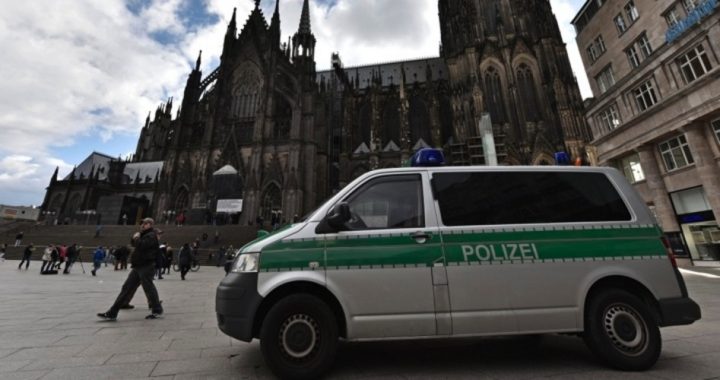
The fallout from the large number of crimes (45 percent of which were sexual assaults) committed against German women over New Year’s Eve in Cologne, Germany, continues. A Reuters news release on January 11 cited a report from the Interior Ministry in the state of North Rhine-Wesphalia (NRW), where Cologne lies, listing a total of 516 criminal complaints being registered pertaining to that date, 237 of which were of a sexual nature.
In addition to being assaulted, many women also had their wallets and cellphones stolen.
The Reuters report also quoted Ralf Jaeger, interior minister in NRW, who described “serious failures” by the police, whom he conceded were significantly outnumbered, but never called for reinforcements.
Jaeger also criticized the police for refusing to make public in the days following the crime spree that the vast majority of the perpetrators were migrants. He blamed this omission on misguided “political correctness.”
“More than 1,000 Arab and North African men gathered on New Year’s Eve near Cologne cathedral (shown) and the main train station. Among them were many refugees that came to Germany in the past months,” Jaeger told a special parliamentary committee in North Rhine-Wesphalia.
The BBC reported on January 11 that Jaeger had fired Cologne’s police chief, Wolfgang Albers, on January 8. A report from ABC went into more detail about Albers’ dismissal and attributed the authorities’ dissatisfaction with the police more to the way they failed to report the incident thoroughly than to anything else. The report said that police failed to mention the attacks around Cologne’s main train station in their initial morning report on New Year’s Day, describing overnight festivities as “largely peaceful.”
Albers acknowledged that mistake shortly afterwards, noted ABC News, but he dismissed widespread criticism that his officers reacted too slowly in response to reports of assaults and harassment of women.
An internal police report published in the German media on January 7 characterized Cologne’s police as overwhelmed and described how women were forced to run through gauntlets of drunken men outside the city’s railway station.
In a January 8 statement, Cologne Mayor Henriette Reker indicated that police had withheld information from her, including information on the origin of suspects, and said that her “trust in the Cologne police leadership is significantly shaken.”
As for the origin of the suspects, the Reuters report stated that a total of 19 of them have been identified, all of them foreigners. A BBC report confirmed these figures, noting that the 19 suspects include 14 men from Morocco and Algeria. Ten of the suspects are asylum seekers, nine of whom arrived in Germany after September 2015.
A German cabinet member, Heiko Maas, who is the federal minister of justice and consumer protection, is of the opinion that the assaults were not spontaneous in nature, but part of a coordinated plan. In a January 10 interview with Bild, Germany’s largest circulation newspaper, Maas said: “No one can tell me that it wasn’t coordinated and prepared. My suspicion is that this specific date was picked, and a certain number of people expected. This would again add another dimension [to the crimes].”
An article about the assertion by Maas posted on Germany’s Deutsche Welle (DW) network’s website noted that Bild “provided details from official police reports citing the use of social networks by some north African migrant communities to encourage their fellows to join them in the square between the Cologne train station and the cathedral, where the now hundreds of incidents of molestation and pick-pocketing took place.”
However, DW also reported that Maas warned against concluding from this incident that all immigrants to Germany are criminals, saying, “to assume from somebody’s origin whether or not they are delinquent is quite reckless.”
The widely publicized New Year’s Eve crimes have produced a response in Germany to limit the flood of migration into the nation from the Middle East and North Africa. Britain’s Daily Mail reported on December 30 that Germany registered over one million migrants in 2015, five times last year’s total. That same report (written a day before the New Year’s Eve crimes) cited an article from Bild accusing German government officials with covering up crimes committed by the large number of refugees flooding the country. The article suggested that the apparent motive for this coverup was to ease the fears of Germans concerned about the impact of this mass migration.
The Bild reporter charged that all of the officials responsible for apprehending aliens who commit crimes, including transporting drugs and selling stolen goods, have been ordered not to talk about it, stating that alien crime was an extremely sensitive subject and officials have been forbidden refer to such crimes in an “offensive manner.”
Amidst the concerns about the flood of refugees and other migrants that have been increased by the recent crimes, Carsten Linnemann, a representative in the Bundestag in Germany’s parliament and a member of Chancellor Angela Merkel’s Christian Democratic Union (CDU) Party, added his voice to those who are critical of Germany’s current immigration policies. Said Linnemann, “If the influx continues as it has, then integration can’t work. If we get another 800,000 or a million people arriving this year, then we won’t be able to do this.”
Merkel is apparently aware that the wide publicity given to the crimes in Cologne may signal a need for some changes in her refugee and immigration policy. “The events of New Year’s Eve have dramatically exposed the challenge we’re facing, revealing a new facet that we haven’t yet seen,” the chancellor told reporters in January in the western city of Mainz following a two-day meeting of leaders of her CDU party.
Photo of police vehicle parked near Cologne cathedral: AP Images
Related articles:
German Newspaper: Officials Are Covering Up Crimes by Migrants
Czech President Calls Influx of Refugees to Europe an “Organized Invasion”



